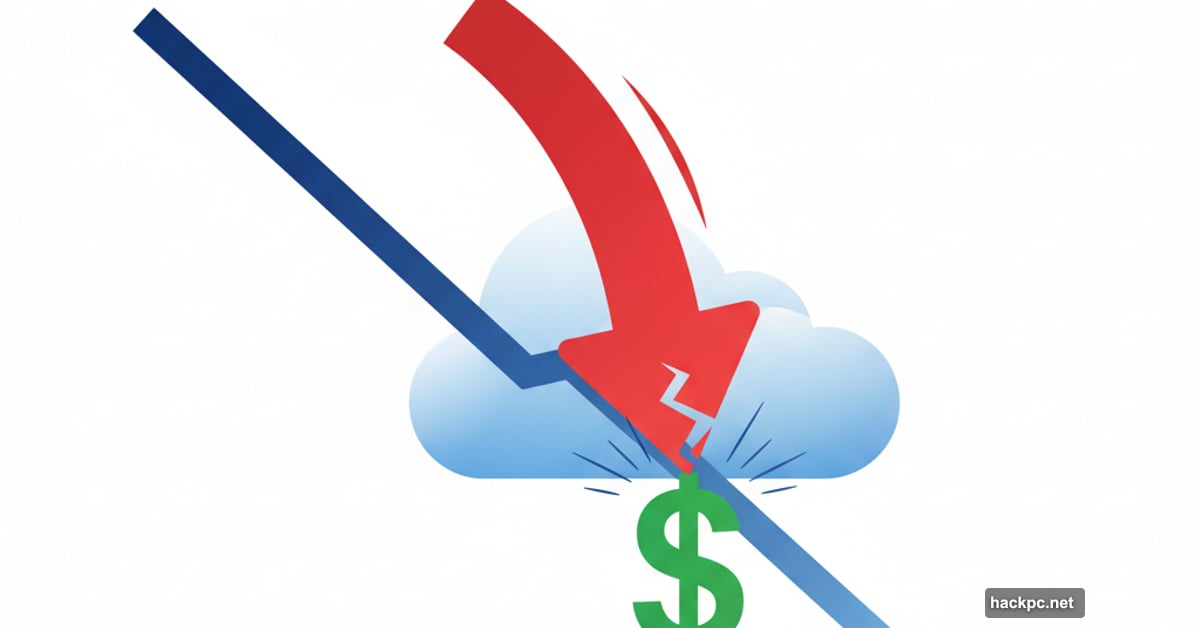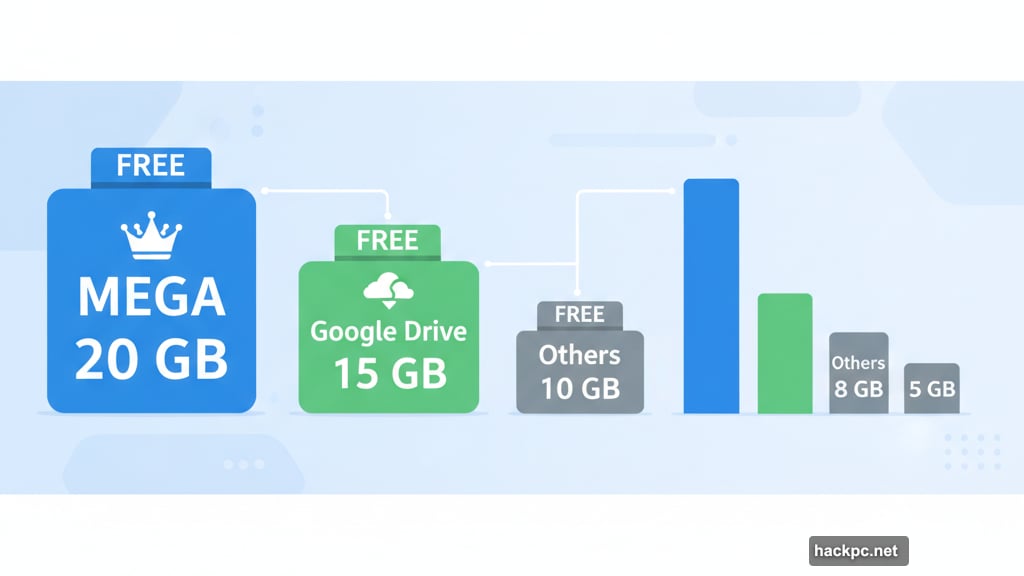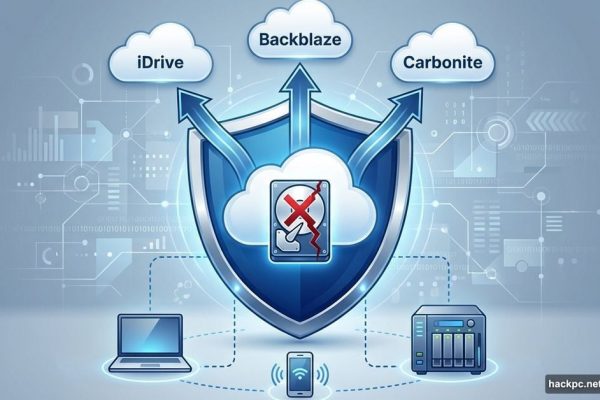
Cloud storage got dirt cheap this year. But picking the “cheapest” option isn’t as simple as comparing price tags.
The truth is, the most affordable cloud storage depends entirely on how much space you need. Some providers offer unbeatable value for small storage plans. Others only make financial sense when you’re storing terabytes of data.
Plus, rock-bottom prices mean nothing if critical features cost extra or don’t exist at all.
So let’s break down who actually offers the best bang for your buck based on real storage needs and features that matter.
The Free Storage Champions Still Reign
Want cloud storage without spending a dime? Two providers dominate the free tier game.
MEGA leads with 20 GB of free storage. That’s more than any other major cloud service offers. Google Drive follows with 15 GB for every account holder.
But here’s the catch with Google’s free plan. That 15 GB gets shared across Gmail, Google Photos, and Drive itself. So if you’re a heavy email user or photo hoarder, your actual Drive space shrinks fast.
MEGA doesn’t play those games. All 20 GB belongs to your cloud storage. Nothing else competes for that space.
However, free storage comes with limitations. Upload speeds get throttled. Features stay basic. And you can’t exactly run a business off 20 GB forever.
Small Storage Plans Tell a Different Story
Need more than free storage but less than 1 TB? Google Drive crushes the competition.
Their 100 GB plan costs just $1.67 monthly. That’s 83% cheaper than most competitors. And the interface works smoothly whether you’re on desktop, mobile, or web.
Plus, Google Drive integrates seamlessly with Docs, Sheets, and Slides. You can edit documents directly in the cloud and collaborate in real time. Comments, suggestions, and task assignments happen without ever leaving the editor.
The downside? Google doesn’t offer end-to-end encryption. Your data gets encrypted on their servers. But Google technically could access your files if they wanted to. That’s a dealbreaker for privacy-conscious users.

For slightly more security at similar prices, pCloud offers 500 GB for $4.17 monthly. They support optional end-to-end encryption through a special Crypto folder. But you’ll pay extra for that feature unless you spring for a business plan.
Medium Storage Gets Interesting
Between 500 GB and 2 TB, the pricing landscape shifts dramatically.
pCloud and IceDrive both offer competitive rates in this range. pCloud charges $4.17 monthly for 500 GB. IceDrive asks $5.99 for the same amount.
But here’s where things get clever. Both providers sell lifetime subscriptions. Pay once and keep your storage forever.
pCloud’s lifetime 500 GB plan costs about four years of monthly subscriptions. After that, you’re storing files for free. IceDrive works similarly.
Sounds tempting? It is. But proceed with caution.
There’s zero guarantee either company survives the next decade. Or that you’ll still want their service in 2035. And “lifetime” doesn’t mean unconditional. Break their terms of service and they’ll still shut down your account.
Still, for users who hate subscriptions and trust these companies long-term, lifetime plans could save serious cash.
Large Storage Tilts Toward MEGA
Storing 2 TB or more? MEGA offers the best value.
Their 2 TB plan costs $8.67 monthly. That’s competitive with Google Drive’s $8.33 rate. But MEGA includes end-to-end encryption by default. Google doesn’t.
MEGA also performed exceptionally well in speed tests. Upload and download speeds beat most competitors. Files synced quickly across devices and stayed current without lag.
The only real weakness? Collaboration features barely exist. You can share files. But you can’t edit documents together in real time like you can with Google or Microsoft.
So MEGA works beautifully for personal storage and file sharing. It falls flat for team projects requiring simultaneous editing.
The Lifetime Plan Gamble
Several providers now push lifetime storage plans hard. pCloud and IceDrive lead this trend.
The math checks out on paper. Pay $200 once instead of $5 monthly for years. After 40 months, you’re ahead financially.
But the risks deserve serious consideration. Cloud storage companies fail. Technologies evolve. Your needs change.
Remember when people bought lifetime subscriptions to now-defunct services? Those purchases became worthless overnight.
Plus, even with a lifetime plan, providers can still terminate your account. Violate their terms and your “lifetime” access vanishes. You won’t get a refund either.
So lifetime plans work for specific users. Those who need stable, long-term storage and trust the provider to stick around. Everyone else might prefer flexible monthly subscriptions.
Features Matter More Than Price
The absolute cheapest cloud storage means nothing if it lacks essential features.
Take encryption, for example. MEGA, IceDrive, and pCloud all support end-to-end encryption. Google and Microsoft don’t. That privacy difference matters deeply for sensitive files.
Or consider collaboration tools. Google Drive excels here with real-time document editing. MEGA offers almost nothing. If you’re working with a team, Google’s slightly higher price pays for itself in productivity.
Sync speed varies wildly too. MEGA and pCloud posted excellent performance in speed tests. IceDrive lagged noticeably behind. Slow syncing wastes time and causes frustration daily.
So before choosing based solely on monthly cost, think about what you actually need. The cheapest option that lacks critical features ends up costing more through lost time and added frustration.
The Transparency Problem
Several budget cloud providers suffer from serious transparency issues.
pCloud’s corporate structure remains unclear. No independent audits verify their security claims. That’s concerning when they’re storing your private files.
IceDrive has similar problems. They claim strong encryption and robust security. But no third-party audits confirm those promises.
Compare that to providers like Google or Microsoft. They publish detailed security reports regularly. Independent auditors verify their practices. Transparency isn’t perfect. But it’s far better than mystery startups.
So cheaper prices sometimes mean accepting more risk and less accountability. That tradeoff might work for casual storage. It’s problematic for important documents or business files.
Team Storage Changes Everything
All the prices discussed so far assume individual use. Team plans flip the economics completely.
Google Workspace offers 2 TB shared storage for $8.33 monthly per user. That’s 3 users minimum, so $25 total. Seems expensive until you realize three people share 2 TB of space.
MEGA charges $15.60 monthly for 3 users. But each user gets their own storage allocation. The pricing structure differs fundamentally.
Dropbox famously costs more than alternatives. But their collaboration features justify the premium for teams. Real-time editing, smart notifications, and seamless sharing make teamwork smooth.
So for businesses, individual storage prices matter less than total cost divided by team productivity gains. The “most expensive” option might actually deliver the best value when factoring in time saved.
2025’s Real Winner Depends on You
No single cloud storage provider wins for everyone.
Need maximum free storage? Choose MEGA’s 20 GB. Want cheap small storage with great collaboration? Google Drive dominates. Storing terabytes privately? MEGA again. Planning long-term and trust lifetime plans? Consider pCloud or IceDrive carefully.
The “best value” depends entirely on your specific needs, priorities, and risk tolerance. Price matters. But features, security, performance, and reliability matter more.
So before committing to any cloud storage based solely on monthly cost, test the free plans. Check what features come included versus cost extra. Read the fine print on lifetime subscriptions. Consider whether you trust the company with your files.
Cloud storage got incredibly cheap in 2025. But smart shoppers look beyond the price tag to find real value.



Comments (0)